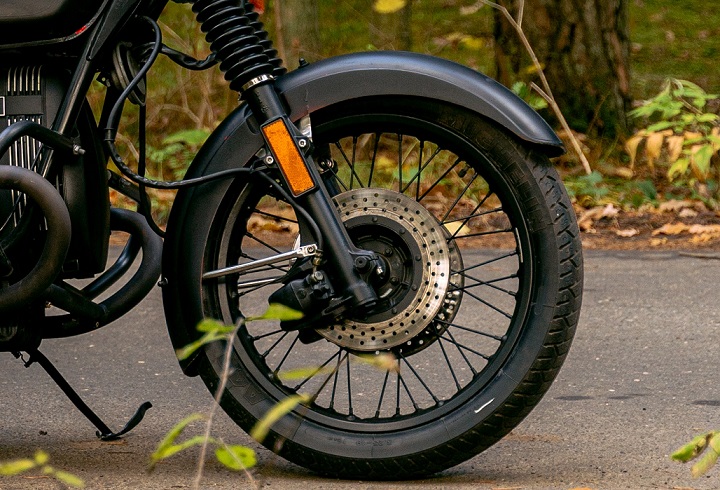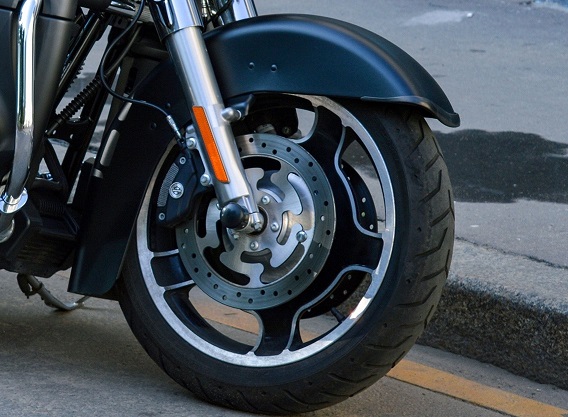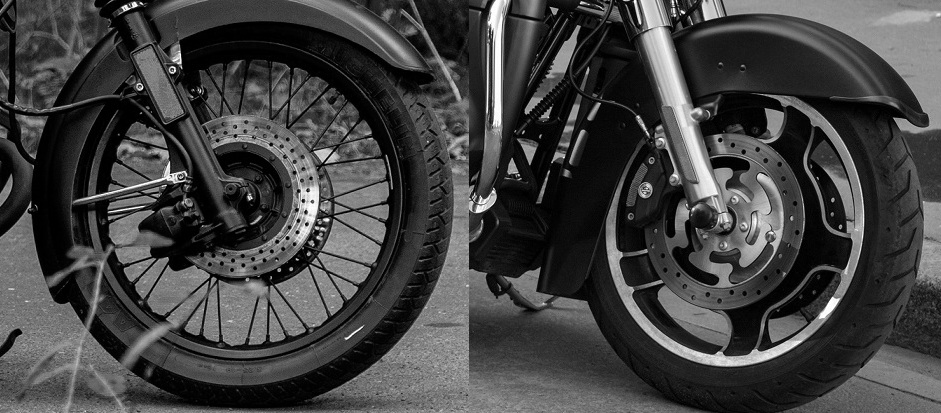Most motorcycle wheels fall into one of two categories. You’ve got your wire-spoke wheels and your one-piece alloy wheels.
So, spoke wheels or alloy wheels, which one is better? For on-road performance motorcycles, alloy wheels are the best since they have tubeless tires which are easy to fix. However, for off-roader bikes that go into difficult terrains, spoke wheels are much better owing to their durability in such conditions.
Now, there are lots of nuances to consider and one needs to understand what spoke and alloy wheels are, what’s their difference, which design is better, and so on.
Let’s break it down!
Alloy Wheels And Spoke Wheels: What Are They?
Spoke wheels
What is a spoke? A spoke is a rod radiating from the center of the wheel(the hub where the axle connects), connecting the hub with the surface.
The main purpose of spokes is to transfer the weight of the rider and the motorcycle between the hub and the rim.
Spoke wheels are made by bending a steel rim in shape and connecting wire spokes to the inner hub and outer rim. A spoke wheel is more or less hand-assembled.
Alloy wheels
Alloy wheels are an admixture of aluminum, magnesium, or nickel.
An alloy is a mixture of a metal or a metal combined with one or more elements. Unlike pure metals alloys do not have a single boiling point; rather, they have a melting range in which the substance is a mix of solid and liquid.
This is one of the reasons why alloys generally provide greater strength over pure metals, which are usually much softer and ductible.
Spoke Or Alloy? A Tossup
Back in the 60s, all motorcycles had spoke wheels. then in the 70s alloy wheels rolled in.
These days the vast majority of bikes come with alloy wheels. But we still see spoke wheels in modern retros and of course, they are mandatory on motocross bikes, dual sports, and serious ATVs.
These alloy wheels made from cast aluminum changed the dynamics of the motorcycling industry as they are cheap, easy to manufacture and allow bikes to run without tubes (as alloy wheels do not have any gaps and the tires fit into them airtight).
I remember going to the MattighofenKTM factory in Austria and seeing an entirely different section with cheerful old ladies, whose job it was to tighten rims and spokes. Most manufacturers who produce a large number of motorcycles love alloy wheels because there is no manual intervention required. Unlike spoke wheels which require an entire group to be put together in place.
Related read: Why motorcycles have wide rear tires and skinny front tires
Big companies like Honda and Kawasaki can crank out thousands of alloy wheels without any human involvement, making them cheaper. You turn the machine on, add your aluminum in, and voila! It comes out the other side finished. Post that, it is just painting and finishing.
However, spoke wheels still hold a fairly large market share.
This is because spoke wheels outperform alloy wheels in one key respect and that is durability. They are much more tolerant of rough abusive terrain.
Even though durability and ease of repair are the primary reasons we see spoke wheels on ATVs, dual-sports, and Motorcross bikes but there is a style aspect to consider.
Motorcycles like the R9T scrambler have spoke wheels not because BMW wants you to thrash your bike offroad but because it suits the image BMW is after. The same goes for all the other modern bikes that are looking to capture a little bit of that classic look and feel.
While the majority of two-wheelers today use alloy wheels, there are few motorcycles that still employ spoke wheels despite being an age-old technology. But there’s a good reason for that. So, to draw a clear comparison, we take a look at their advantages and disadvantages.
Spoke Wheels – Pros And Cons

Advantages Of Spoke Wheels
Firstly, Spoke wheels are more durable than single-piece cast wheels, hence widely used on off-road bikes, enduros, dirt bikes, scramblers, and ATVs.
Second, when talking about flexibility, spoke wheels steal the show again. The reason is its capacity to absorb shock on a hard landing.
The chain of shock absorption begins with the tires doing the honors, then transferring the job to the wheels, which, in turn, pass, on the blow to the suspension. In case the wheels are not strong enough to bear the bump, they might end up bending instantly or even breaking down.
Third, Spoke wheels are also easily repairable, as replacing individual parts is simple and inexpensive, unlike alloy wheels, which, once cracked need replacement.
Then there’s the aesthetic appeal where certain manufacturers use spoke wheels just to add to a bike’s overall look.
And lastly, spoke wheels make for a better road-ride, especially if you are surrounded by bad road conditions. Spokes work out to be cheaper for off-road rides. Their alignment is cheaper and can be serviced easily by a local mechanic too.
Disadvantages Of Spoke Wheels
Most motorcycles running on spoke wheels use inner tubes which make swapping tubes, fixing punctures troublesome and time-consuming as the entire wheel assembly needs to be taken off to do so.
Apart from this, fixing a loose or broken spoke still requires human intervention. While tubeless tire-compliant spoke wheels are available they are very expensive.
Sports bikes need to be light to be fast and hence they are constructed out of alloy wheels. They even provide greater stability when zooming at a faster pace. This feature lacks in spokes wheels, and hence they are preferred for dirt bikes and not for sports bikes.
Alloy Wheels – Pros And Cons

Advantages Of Alloy Wheels
The rigidity aspect in alloy wheels helps them endure high amounts of horsepower and torque with relative ease. As a result, they are more stable at high speeds.
One of the biggest advantages of alloy wheels is that they can accommodate tubeless tires which spokes wheels cannot. Thus simplifying tire changes and puncture repairs
When the conditions of the road are extremely poor, we need wheels that can bear the brunt while promising a smooth ride to the commuter.
Despite this, motorcycle manufacturers use more alloy wheels for the simple reason that they are light in weight.
This feature of alloys over spokes assist in reducing the overall weight of the motorcycle and hence promises better efficiency at low fuel consumption.
Also, cleaning alloy wheels is easier than cleaning spoke wheels.
Related read: Repairing motorcycle alloy wheels
And lastly, you can find different styles and colors in alloy wheels. However, in spoke wheels, there isn’t much to choose from.
Disadvantages Of Alloy Wheels
The biggest disadvantage of alloy wheels is the fact that it doesn’t flex.
Consequently, when the wheel hits a sharp bump or pothole at high speeds, it tends to dent or crack. Unfortunately, they can’t be fixed and need to be replaced altogether, which can drill a hole in your pocket.
Fun trivia: There are numerous patents on ways you can mount a spoke into a rim, to create a tubeless spoke wheel. All these patents are what make the entire process of producing a tubeless spoked wheel so expensive. Although in terms of technology or manufacturing, it is not that complicated to do. Extensive patenting is the reason why you will see very few tubeless spoke wheels as opposed to tubed spoke wheels.
Final Verdict
From the above discussion, it is evident that there is no one-size-fits-all when debating about which wheels prove to be better for a -spokes or alloy.
Given the chance, I would choose an alloy wheel just because the tubeless tire is lighter and fixing a puncture on a tubeless tire is much faster and much simpler. Easier than dealing with an inner tube. And overall an alloy wheel suits my needs best.
But if you are looking for hardcore offroading, you should opt for spoke wheels. Rims, spokes, hubs, and a tube might make it a bit heavier. Fixing it too can be a pain but at least if you manage to damage the wheel, you won’t have to unwillingly replace the entire wheel, just one small part.
For example, in theory, if you dent a rim, you can unbend a rim or replace the rim without really touching the spokes or the hub. If you break spokes, you can even replace one spoke at a time. If you break a hub- which is very rare, then you can just replace the hub without having to do the rest of the wheel.
So, for the more performance-oriented road bikes – you should choose cast-alloy wheels because cast wheels are easier to make. They are more consistent in their performance and you get better feedback.
But when you start talking about off-roader motorcycles that go into difficult conditions, then you should go with spoke wheels because obviously, they are easier to fix.
